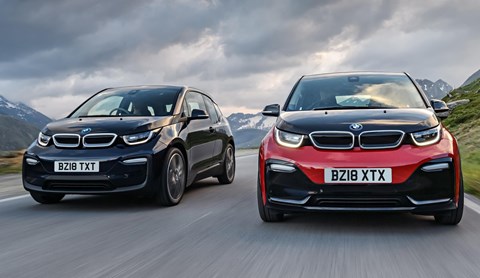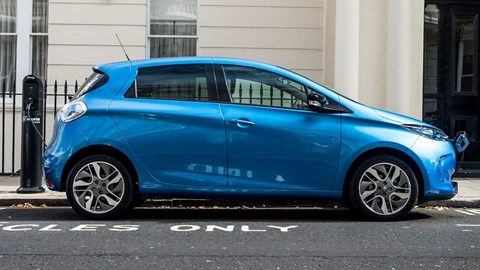► Another U-turn? EV grants extended
► Plug-in Car Grant lives until March 2023
► £1500 electric car grants available again
The UK government has made numerous U-turns in autumn 2022 – but one of the better ones is the decision to extend the Plug-in Car Grant (PiCG) until March 2023, albeit for just a few customers with orders already in the pipeline.
Ministers had announced the withdrawal of the incentive scheme to all new EV orders on 14 June 2022, but on 4 October it appeared to change its mind. The grants have been extended until next spring to reflect the long lead times for electric vehicles (EVs) in the wake of the pandemic and global chip shortage.
The PiCG has subsidised the purchase of more than 500,000 electrified vehicles in the UK over the past decade, data confirms, saving Brits a not-inconsiderable £1.4 billion. Those numbers will swell a little with this modest extension.
Plug-in Car Grant extended – sort of
The PiCG is now being extended to handle dealer orders already made, meaning that customers whose cars have been heavily delayed will still be able to qualify for a modest £1500 saving.
The Office for Zero Emissions Vehicles (OZEV) will cover dealer registrations made from 14 June 2022 to 31 March 2023, so people with orders in the pipeline should be able to receive the discount. However, if you walk into a dealership today, you will not qualify for the saving – and probably won’t find any plug-in stock available anyway.
Furthermore, the Plug-in Car Grant is only applicable to new cars whose RRP is below £32,000, meaning that many EVs fall outside this price bracket.
Electric car discounts: background to the UK’s EV incentives
British motorists had benefited from the Plug-in Car Grant scheme, which encouraged the take-up of electric cars since 2011. The financial incentives arrived around the same time as the first-generation Nissan Leaf – an electric car that broke new ground by being everyday-usable in an era when most electric cars were still something of a joke – and provided a £5000 cash discount off the list price of any qualifying vehicle.

The incentive was launched primarily to reduce emissions and improve air quality through increased take-up of zero-emissions vehicles (EVs and plug-in hybrids, or PHEVs). The UK government said that the grant influenced the sale of more than 100,000 EVs in the first five months of 2022 before it was scrapped in June.
If you purchased an eligible car, the dealer would sort out all of the paperwork and the grant was be deducted from the car’s list price. The PiCG only applied to new purchases – it wasn’t possible to get cash off the price of a used vehicle.
The government revised the PiCG in 2016, 2018, 2020 and again in March 2021, reducing the number of cars covered by the grant as well as the amount of money offered. In 2016, the amount offered was reduced from £5000 to £4500 (or £2500 for plug-in hybrids) before reducing further in 2018, with EVs then receiving a grant of £3500. That was the point at which PHEVs were no longer eligible for the grant.

Then in the spring 2020 Budget, this was further reduced to £3000 – and it was adjusted twice again to £2500 then £1500 over the course of 2021. The logic being, if you could afford a super-duper top-end EV, taxpayers’ money shouldn’t be used to subsidise you.
Which cars qualified for the Plug-in Car Grant subsidy before its withdrawal?
- Citroen ë-C4 – Sense Plus
- Citroen ë-C4 – Shine
- DS 3 Crossback E-Tense – Prestige
- DS 3 Crossback E-Tense – Performance Line
- Honda E
- Hyundai Ioniq Electric – Premium
- Hyundai Kona Electric (39kWh) – SE Connect
- Hyundai Kona Electric (39kWh) – Premium
- Kia e-Niro (39kWh) – 2
- Mazda MX-30
- MG MG5 EV
- MG ZS EV
- Mini Electric – Level 1
- Mini Electric – Level 2
- Mini Electric – Level 3
- Nissan e-NV200 (5 seater) – Visia
- Nissan e-NV200 (7 seater) – Visia
- Nissan Leaf (40kWh) – Acenta
- Nissan Leaf (40kWh) – N-Connecta
- Nissan Leaf (40kWh) – Tekna
- Peugeot e-208
- Peugeot e-2008 – Active Premium
- Peugeot e-2008 – Allure
- Renault Zoe
- SEAT Mii electric
- Skoda Citigo-e iV
- Skoda Enyaq iV 60 Nav – Loft
- Skoda Enyaq iV 60 Nav – Lodge
- Smart EQ ForTwo
- Smart EQ ForFour
- Vauxhall Corsa-e
- Vauxhall Mokka-e – SE Nav Premium
- Volkswagen e-Golf
- Volkswagen e-Up
- Volkswagen ID.3 Pro (58kWh 145PS) – Life
- Volkswagen ID.3 Pro Performance (58kWh 204PS) – Life
Industry body the Society of Motor Manufacturers and Traders had heavily criticised the axing of the Plug-in Car Grant earlier in the year.
Chief exec Mike Hawes said in summer 2022: ‘The decision to scrap the Plug-in Car grant sends the wrong message to motorists and to an industry which remains committed to Government’s net zero ambition – we are now the only major European market to have zero upfront purchase incentives for EV car buyers yet the most ambitious plans for uptake. This decision comes at the worst possible time.’
Further electric car reading: